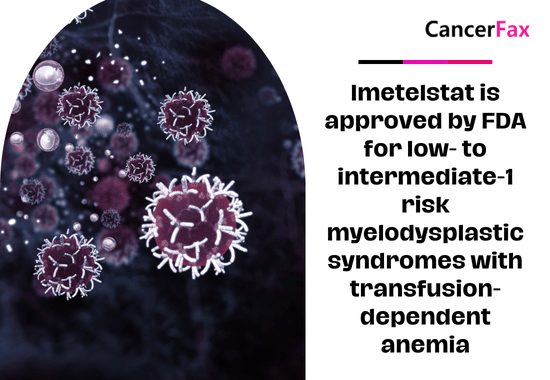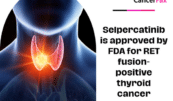Imetelstat is approved by FDA for low- to intermediate-1 risk myelodysplastic syndromes with transfusion-dependent anemia
May 2024: Imetelstat (Rytelo, Geron Corporation), an oligonucleotide telomerase inhibitor, has been approved by the Food and Drug Administration for use in adults with low- to intermediate-1 risk myelodysplastic syndromes (MDS) who have transfusion-dependent anemia and require four or more red blood cell units over 8 weeks. This approval is specifically for patients who have not responded to, lost response to, or are ineligible for erythropoiesis-stimulating agents (ESAs).
The effectiveness of the treatment was assessed in a clinical trial called IMerge (NCT02598661). This experiment was conducted in multiple centers and involved 178 patients with MDS. The trial followed a randomized, double-blind, and placebo-controlled design, with a ratio of 2:1 between the treatment group and the placebo group. Following a 28-day treatment cycle, imetelstat at a dose of 7.1 mg/kg was given intravenously as a placebo or until the disease got worse or the side effects became too much to handle.
The randomization process was divided into groups based on the number of red blood cell (RBC) transfusions received previously and the risk level determined by the International Prognostic Scoring System (IPSS). Every patient got supportive treatment, which involved the administration of red blood cell transfusions.
The effectiveness of imetelstat was determined by analyzing the data from patients who were followed up for a median time of 19.5 months (ranging from 1.4 to 36.2 months) in the imetelstat group and 17.5 months (ranging from 0.7 to 34.3 months) in the placebo group. The analysis was based on the proportion of patients who achieved a period of at least 8 weeks and 24 weeks without needing a red blood cell (RBC) transfusion. This was defined as not receiving any RBC transfusion during any consecutive 8-week period or any consecutive 24-week period, respectively, from the time of randomization until the start of any subsequent anti-cancer treatment (if applicable).
39.8% (95% CI: 30.9–49.3) of people in the imetelstat group did not need a red blood cell transfusion for at least 8 weeks, compared to only 15% (95% CI: 7.1–26.6%) of people in the placebo group (p-value < 0.001). The proportion of patients achieving a > 24-week red blood cell transfusion independence was 28% (95% confidence interval [CI]: 20.1, 37) in the imetelstat group and 3.3% (95% CI: 0.4, 11.5) in the placebo group (p-value < 0.001).
The most common bad reactions (≥ 10% with a difference of >5% compared to placebo), which included problems in lab tests, were lower platelets, lower white blood cells, lower neutrophils, higher aspartate aminotransferase, higher alkaline phosphatase, higher alanine aminotransferase, fatigue, longer partial thromboplastin time, joint and muscle pain, COVID-19 infections, and headaches.
The suggested imetelstat dosage is 7.1 milligrams per kilogram of body weight, given in an intravenous infusion lasting 2 hours, once every 4 weeks.
Susan Hau is a distinguished researcher in the field of cancer cell therapy, with a particular focus on T cell-based approaches and cancer vaccines. Her work spans several innovative treatment modalities, including CAR T-cell therapy, TIL (Tumor-Infiltrating Lymphocyte) therapy, and NK (Natural Killer) cell therapy.
Hau's expertise lies in cancer cell biology, where she has made significant contributions to understanding the complex interactions between immune cells and tumors.
Her research aims to enhance the efficacy of immunotherapies by manipulating the tumor microenvironment and exploring novel ways to activate and direct immune responses against cancer cells.
Throughout her career, Hau has collaborated with leading professors and researchers in the field of cancer treatment, both in the United States and China.
These international experiences have broadened her perspective and contributed to her innovative approach to cancer therapy development.
Hau's work is particularly focused on addressing the challenges of treating advanced and metastatic cancers. She has been involved in clinical trials evaluating the safety and efficacy of various immunotherapy approaches, including the promising Gamma Delta T cell therapy.
- Comments Closed
- June 20th, 2024






FDA-approved MDS drugs 2025, Hematologic malignancy breakthrough, Imetelstat FDA approval, Low-risk MDS treatment, MDS anemia therapy, Myelodysplastic syndromes treatment, Telomerase inhibitor drug, Transfusion-dependent anemia solution
CancerFax is the most trusted online platform dedicated to connecting individuals facing advanced-stage cancer with groundbreaking cell therapies.
Send your medical reports and get a free analysis.
🌟 Join us in the fight against cancer! 🌟
Привет,
CancerFax — это самая надежная онлайн-платформа, призванная предоставить людям, столкнувшимся с раком на поздних стадиях, доступ к революционным клеточным методам лечения.
Отправьте свои медицинские заключения и получите бесплатный анализ.
🌟 Присоединяйтесь к нам в борьбе с раком! 🌟